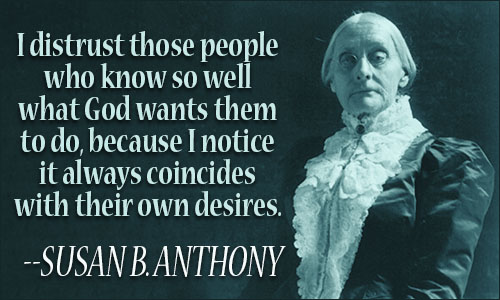by LINDA FORD
 Susan B. Anthony (1820-1906) played a prominent role in Women’s suffrage in the United States PHOTO/Notable Quotes
Susan B. Anthony (1820-1906) played a prominent role in Women’s suffrage in the United States PHOTO/Notable Quotes
I am a retired history professor and historian of women, a socialist, and a radical feminist. I know what feminism is, and I know it’s being co-opted. What is feminism? How is it defined? Feminism is the belief in equality for women. But feminism is being used now for unrelated, or even opposite causes, like war, transgender bathrooms, anti-Russia hysteria and political opportunism.
Large crowds of women descended on Susan B. Anthony’s grave in Rochester, NY, on Election Day 2016. Anthony’s grave, in what I saw as a desecration, became completely covered with “I Voted” stickers. I was not surprised to see Mayor Lovely Warren (Democrat) and Congresswoman Louise Slaughter (Democrat) prominently present, nor was I astounded that all of the women interviewed were voting for Hillary Clinton (Democrat and not really a feminist). So therefore I was also not shocked to learn that the whole long queue—at one point taking two hours to get through—was organized by local Democrats. What would Susan B. Anthony’s reaction have been to this purported homage to her struggle for equal political rights for women? As a self-proclaimed “revolutionary” for women’s rights, and a woman who always refused to support any “party not fully and unequivocally committed to equal rights for women,” I do not believe she would have welcomed a demonstration instigated in the service of a political party not fully committed to women’s equal rights, and definitely committed to endless war and global, capitalist-based inequality for women.
Anthony advocated egalitarian feminism (as opposed to so-called 19th century “domestic” feminism, limited to power growth within the family), as did her comrade Elizabeth Cady Stanton. They fought for equal political rights for women first, believing that women’s social and economic rights would follow from women gaining political rights, not without a struggle of course. They believed, like Alice Paul and the National Woman’s Party of the early 20th century, like the 1970s wave of feminists and (to a large extent) the weatherwomen of the 1980s and the Earth First! women of the 1990s and early 00s, that women are the same as men in intelligence and abilities (with exceptions in obvious physical strength, for some), but many also believed, paradoxically, that women are superior to men because of being inherently nonviolent and compassionate. Seeking male-female equality through various political, social and cultural means, has never been easy: it has always been met with, sometimes violent, resistance by the patriarchy.
Feminism has also been constantly thwarted by co-optation. The champion co-opter of potentially radical social and political movements, is the Democratic Party. In working on my present book on women political prisoners from the late 19th century to the present, I have seen it again and again. The American political system has nearly always been dichotomous, and the Democratic Party, especially in the 20th century, with its image and brand as “liberal” and “progressive,” became the party which absorbed labor unrest, black civil rights, and feminism. Once “feminists” are re-imagined as liberal Democrats, revolution (sorry Susan B.) and radicalism are done. I remember being part of a Seneca Falls ERA Conference/Celebration in 1998, and witnessing Hillary Clinton’s triumphal entrance into the city. My remark to the woman standing next to me about Bill Clinton’s questionable personal relations with women (not only affairs, but evidence of procurement, and possible assault and rape) was met with visible horror and a literal turning away from such sentiments. Hillary Clinton is also not a feminist, if that means actually working to help women in the aggregate gain equal rights and a better life—not as a First Lady, Senator, or Secretary of State. She definitely, as Barbara Ehrenreich has written, smashed the “myth of innate female superiority” when it came to advocating and wielding violence. Ehrenreich also notes Clinton’s “racial innuendoes,” along with her “free-floating bellicosity.” So plastering Susan B. Anthony’s grave with “I Voted” for Hillary stickers was not really appropriate.
Counter Punchfor more
